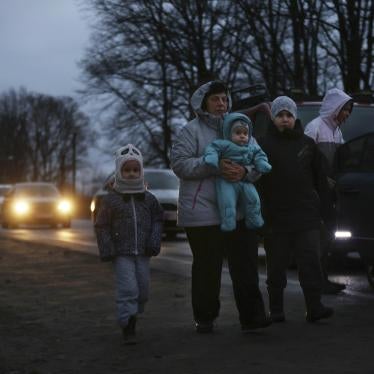The United Kingdom should urgently ensure that anyone fleeing the conflict in Ukraine can find sanctuary in the country by temporarily waiving visa requirements, Human Rights Watch said today. The UK should also scrap the Nationality and Borders Bill, which would criminalize efforts to seek asylum in the UK through irregular means.
“The UK should do all it can to provide people fleeing Ukraine with a safe route to travel to the UK, including with a temporary visa waiver,” said Yasmine Ahmed, UK director at Human Rights Watch. “The government’s concession to provide sanctuary to Ukrainians with close family members in the UK is not enough, and all civilians fleeing the conflict in Ukraine should have the option of safe passage to the UK.”
The UK has announced visa concessions allowing the family members of British nationals and of Ukrainians settled in the UK to apply for a free family migration visa from the new, temporary Lviv visa application center or from outside Ukraine, including the spouses of British nationals, unmarried partners, children, adult offspring, parents, grandparents, and siblings.
But Ukrainians without a family connection to the UK and third country nationals are still subject to the normal UK visa restrictions, and the UK government has said they will not be able to apply for a visa at the Lviv center. They would have to find a way to cross the border and apply at a visa application center in a neighboring country, Human Rights Watch said.
Human Rights Watch has spoken with foreign nationals who said Ukrainian authorities prevented them from boarding evacuation trains or stopped them from reaching the border to make way for Ukrainian women and children. The African Union issued a statement on February 28 urging “all countries to respect international law and show the same empathy and support to all people fleeing war notwithstanding their racial identity.” There are reports also of some foreign nationals facing problems at EU borders. On March 1 while commending neighboring countries for keeping their borders open, UNHCR said it was “aware of challenges faced by some third country nationals seeking to enter Poland.” The government’s plans to establish a specialized community sponsorship pathway for Ukrainians without family ties to the UK could be helpful, but would need to be operationalized quickly.
The UK government has announced that it will provide 40 million GBP in additional humanitarian aid and wider economic support to Ukraine, in addition to logistical and humanitarian support to Ukraine’s neighbors. It is also providing military support.
The UK’s response falls behind that of its neighbors, Human Rights Watch said. Ireland has immediately lifted visa requirements for Ukrainian nationals, allowing them to travel to Ireland without a visa and granting them 90 days from arrival to regularize their status. The European Union, in what would be an unprecedented move, is likely to trigger the EU’s 2001 Temporary Protection Directive, which was drafted following the 1990s Yugoslav Wars and Balkan refugee crisis.
There appears to be broad support for the measure by EU home affairs ministers, with a proposal being submitted to the Justice and Home Affairs Council imminently. The mechanism offers an efficient option to provide temporary protection to displaced people and those unable to return to their country of origin in situations of mass influx for one to three years. Member states would equitably share responsibility for providing this protection without the need for individual processing of asylum claims while durable solutions are sought.
In situations of acute crisis, governments should act in good faith not to obstruct individuals’ rights to leave their country and to seek asylum, using measures such as temporarily suspending visa and other travel requirements and not imposing penalties for irregular migration, Human Rights Watch said. Situations like Ukraine illustrate how visa restrictions and penalties imposed on airlines for transporting undocumented people can prevent many asylum seekers from boarding a plane to safety.
At the same time as this crisis is unfolding, the Nationality and Borders Bill is being debated in the House of Lords, and seeks to introduce into UK domestic law provisions for asylum seekers without a visa or passport who attempt to reach the UK, potentially including those fleeing Ukraine, to be sent abroad for offshore detention. It would also allow for pushbacks at sea, and provides that those who do manage to reach the UK would face criminal penalties with prison sentences of up to four years. The provisions would violate obligations under international refugee law, human rights law and the duty to rescue people at sea in distress, Human Rights Watch said.
“The crisis in Ukraine has brought into sharp focus the inhumanity and devastating effects the Nationality and Borders Bill would have on people fleeing conflict and persecution, including from Ukraine,” Ahmed said. “The UK should scrap the bill and ensure that everyone arriving at its border has access to an asylum procedure on UK territory and is treated with humanity and dignity, regardless of how they arrive.”







